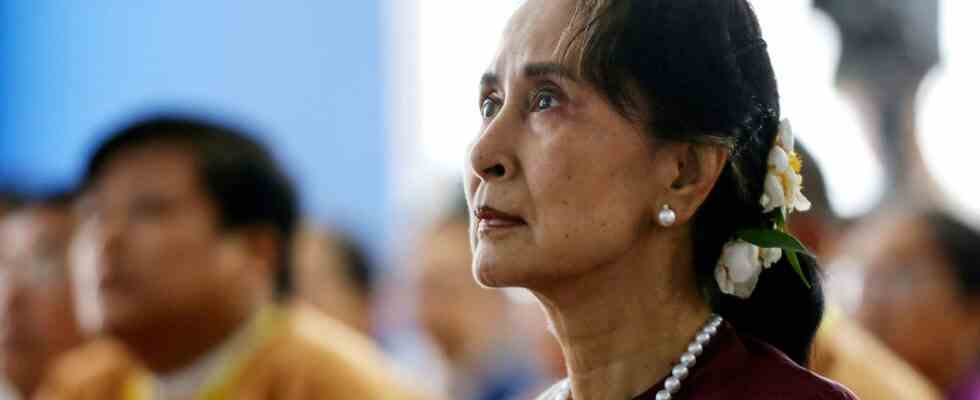Status: 06/23/2022 12:42 p.m
The situation for Myanmar’s ex-Prime Minister Aung San Suu Kyi is becoming increasingly serious: the Nobel Peace Prize winner has been placed in solitary confinement. The junta continues to deny the Red Cross visits to prisons.
Myanmar’s ousted ex-prime minister Aung San Suu Kyi is used to years of house arrest – but now she is even more isolated. The Nobel Peace Prize winner has been taken to a prison in the capital Naypyidaw, junta spokesman Zaw Min Tun said. The 77-year-old is said to be in solitary confinement there.
Myanmar’s civil disobedience movement tweeted that the junta’s behavior was “vindictive and shameful”.
A spokesman for the shadow government (Government of National Unity, NUG) tweeted that they were very concerned about Suu Kyi’s transfer to solitary confinement. “Aung San Suu Kyi and all political prisoners in Myanmar must be released,” it said.
Various alleged offenses
Suu Kyi was arrested and placed under house arrest during the February 2021 military coup. The prominent politician has been in court for months for numerous alleged offenses. Among other things, she is confronted with almost a dozen corruption lawsuits. The politician faces up to 15 years in prison for each charge.
In April, a first verdict was made for corruption: a court sentenced Suu Kyi to five years in prison. However, it was not clear for a long time whether she really had to go to prison. She herself had denied the accusation of accepting gold and a $600,000 (560,000 euro) bribe from a politician.
Human rights activists speak of a show trial
She had previously been sentenced to six years in prison for minor offenses in another trial. The court dates are closed to the public. Suu Kyi’s lawyers are not allowed to communicate with the media. Human rights activists speak of a show trial. They criticize the charges as being politically motivated in order to finally neutralize Myanmar’s opposition.
Suu Kyi had previously been under house arrest for a total of 15 years. Almost 20 years ago, she was held briefly in Insein Prison, notorious for its torture methods, in the largest city of Yangon.
Too dangerous for the generals?
She has been the de facto head of government since 2016 and the former Burma on the way to timid democratic reforms. In the parliamentary elections in November 2020, she secured a second term with a clear lead. Observers believe that it had become too dangerous for the generals, who had ruled the country for decades with an iron fist, and that they therefore staged a coup in early 2021. The junta, on the other hand, justified the overthrow with alleged electoral fraud – but no evidence was presented. The country has been engulfed in chaos and violence for almost a year and a half.
No visits to prisons
The junta also continues to deny the International Committee of the Red Cross (ICRC) and family members visits to prisons. The ICRC’s Asia-Pacific Regional Director, Christine Cipolla, has called for humanitarian prison visits to resume “as soon as possible”, according to the independent Myanmar news portal Mizzima. Cipolla was in Myanmar from June 15th to 18th and met with representatives of several ministries.
After the coup of February 1, 2021, the junta banned visits from prisoners and justified the ban, which is still in force today, with the corona pandemic. Meanwhile, in large parts of Myanmar, the army is continuing its offensive against the resistance with all military means.

